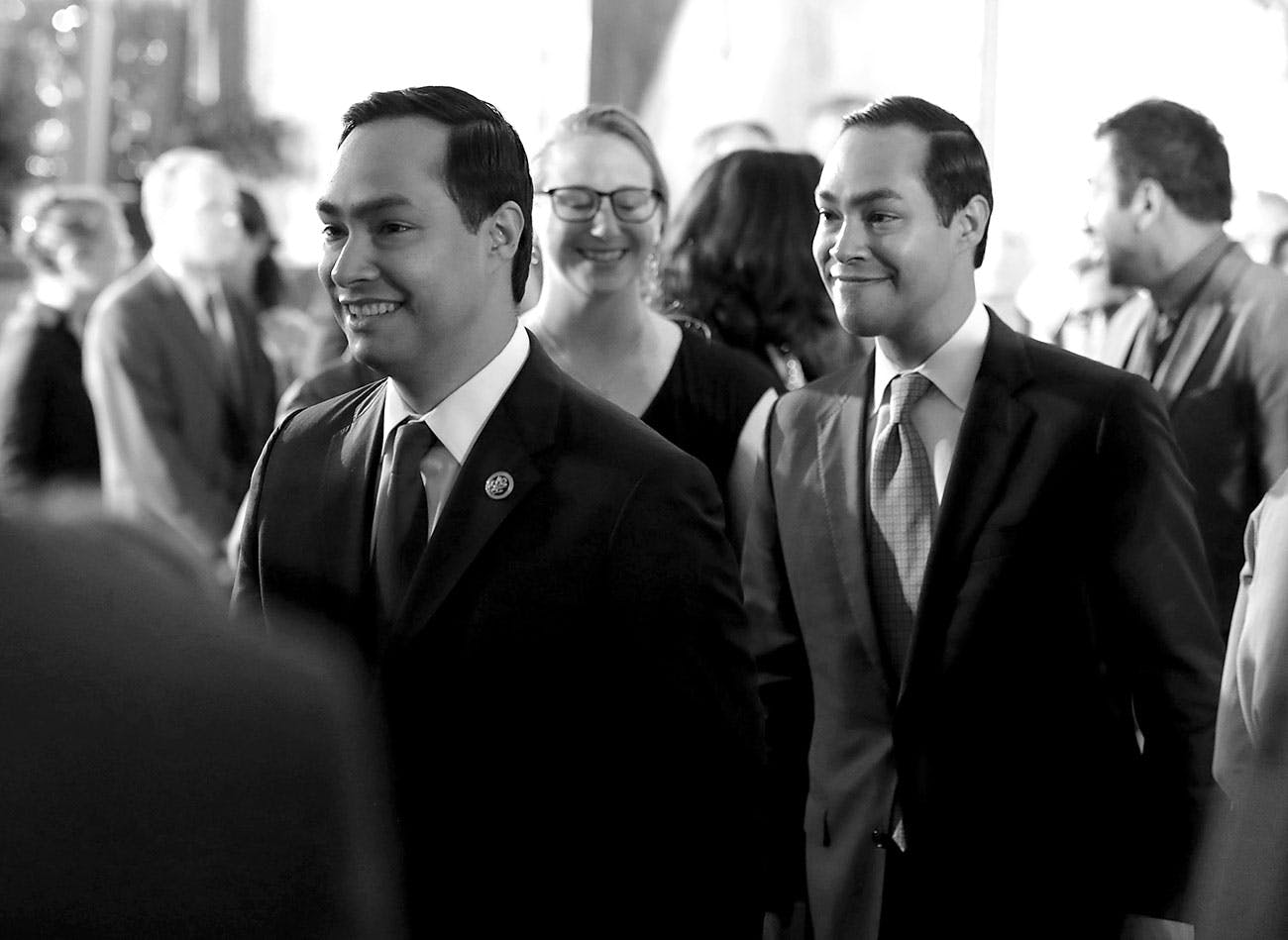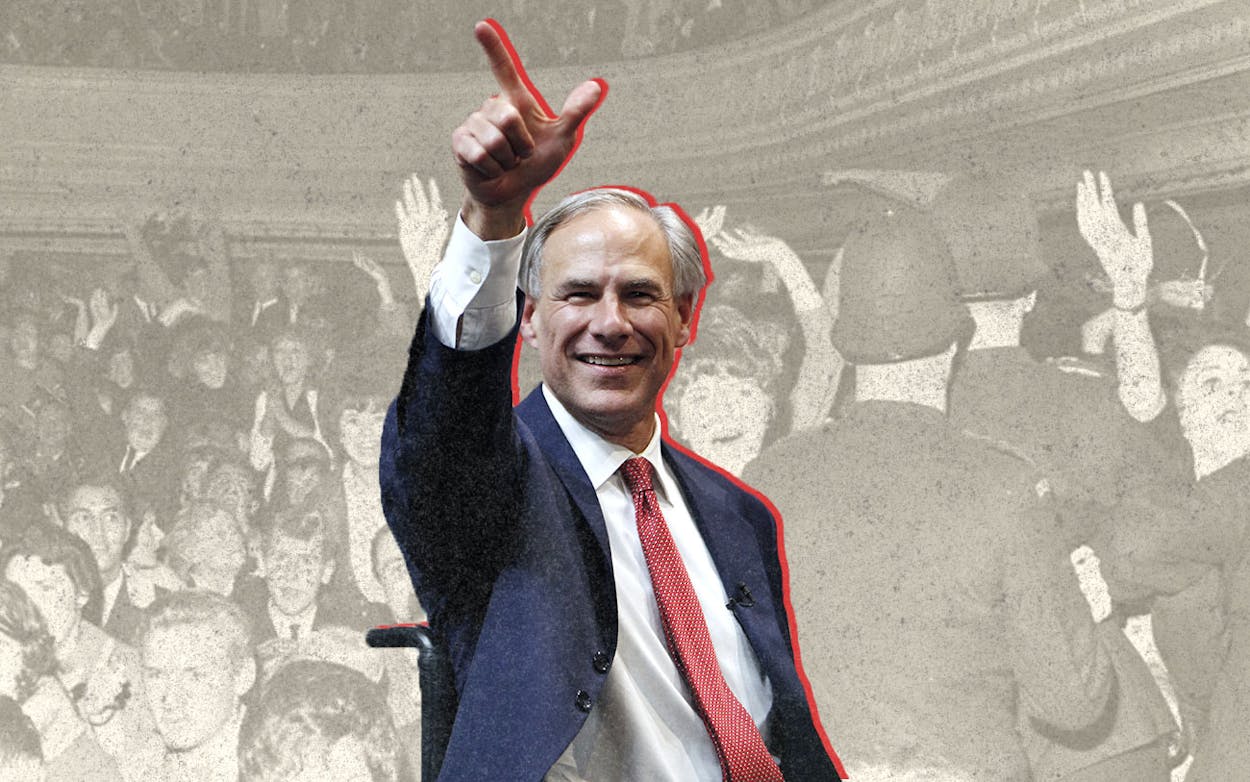Texas political reporters are chasing congressman Joaquin Castro with a single question: Will he challenge Governor Greg Abbott’s re-election? Castro, seemingly enjoying the attention, coquettishly says no without actually offering a definitive answer. As Castro demurs, other names pop up as potential Democratic gubernatorial candidates: Castro’s brother, Julián; University of Texas Chancellor Bill McRaven; Hill+Knowlton Strategies Chairman Jack Martin; and Dallas businessman Mark Cuban. Rumor upon rumor. But with the December 11 candidate filing deadline growing closer every day, the Democrats still have no challenger for Abbott.
The reason for that is fairly simple. A poll circulating among the state’s Democratic leadership—which I was given on the agreement that I would not identify its source, but I have confirmed the information with additional Democratic operatives—shows Abbott is currently the most popular politician in Texas, with less than 30 percent of the state’s voters viewing him unfavorably. If the election had been held when the poll was conducted this summer among 1,000 registered Texans likely to vote in 2016, Abbott would have received 49 percent of the vote, and a Democrat to be named later would have scored 38 percent. That’s about the same percentage of the vote Democrat Wendy Davis received in her 2014 loss to Abbott. The poll also notes that Abbott’s name identification among voters was 91 percent. Castro’s was 44 percent. It was not a general survey of voters, because it oversampled Hispanics and voters in some targeted state House districts. About 37 percent of the respondents were Democrats, 19 percent independents, and 44 percent Republicans.
I only received a portion of the survey relating primarily to Abbott and the president, but it seems to show that the Donald Trump effect that Democrats have been hoping for is missing in Texas. Although the president’s personal favorable/unfavorable rating and job approval is about even, Abbott’s job approval was 61 percent, followed by U.S. Senator Ted Cruz at 55 percent. Not to mention that a whopping 76 percent of Texans had a positive view of the state’s economy—a key metric for incumbents.
Still, these numbers are in no small part because Abbott is Governor Bland. When asked whether he has ever done anything to make respondents proud, half said no, while less than 40 percent said yes. Has he ever done anything to make you angry? Sixty-seven percent said no.
The poll did produce some useful takeaways for Democrats though. For instance, 82 percent of poll respondents said the Legislature spends too much time on issues like the bathroom bill. President Trump’s health care proposals and plan to build a wall on the Texas border were opposed by half of those surveyed, and 65 percent said the state’s Medicaid program should be expanded to provide health care to more people. Fifty-eight percent opposed dividing families to deport undocumented immigrants, but support for the sanctuary cities law was split 40-40. The remaining 20 percent had no opinion.
More than just a candidate problem, Democrats have a brand problem. To the question, “The Democrats are too liberal for Texas and soft on border security,” 56 percent agreed. In recent elections, Democrats have done well in the state’s largest cities with black, Hispanic, and white liberal populations, but seem to be identified among white voters in smaller towns and rural areas with a national party that they don’t believe represents them.
The big question is what the state Democratic leadership will do in the face of such uphill numbers. Major parties need to field strong candidates for top-of-the-ticket races like governor. (Technically, the U.S. Senate race is the top of the ticket, and Democrat Beto O’Rourke is running to challenge Cruz. But in Texas, the focus always has been more on the governor’s contest rather than potential new D.C. Texpats.) Traditional politicians like the Castro brothers would find themselves in a tough contest against an incumbent as popular as Abbott appears. Without a major challenger, Abbott would be free to spend his $41 million campaign fund on defeating Democrats at the local level and Republicans who have opposed him in the Texas House.

Some Democrats are hoping a wealthy businessman or trial lawyer will step forward to self-fund a strong contest that challenges Abbott on his weaker polling issues such as education, college tuition, and health care. On most issues in the poll, Texans rated Abbott’s positions positively, though not overwhelmingly so. But he had a weak performance on public education, the cost of college, and health care. On the cost of a higher education, just 26 percent gave Abbott a positive rating, and 46 percent disapproved of the job he is doing. If such a candidate arose, it could redefine Abbott.
The best strategy for the self-funded millionaire Democrat is to announce in November, shortly before the filing deadline, to run a 365-day campaign that costs $20 million to $30 million. By announcing late, the candidate would know whether he or she would have to spend major money just to win the party nomination, money that could be better spent on the general election. It also reduces the amount of time Republicans would have to run a negative campaign against them.
But the biggest problem for Democrats with Abbott is that a sacrificial lamb candidate, or even a wealthy candidate who runs a poor campaign, can have a negative effect on candidates in down-ballot races.
So the other idea is to skip the governor’s race to concentrate on incumbents such as Patrick and Cruz. CPA Mike Collier, who ran an unsuccessful race for comptroller last year, has announced against Patrick, who is closely linked to the unpopular bathroom bill. There also are other potential down-ballot state races where the incumbent might be vulnerable, such as Agriculture Commissioner Sid Miller, who has been making bad publicity a habit. Republican Attorney General Ken Paxton is under indictment on securities fraud charges, and I’m told several attorneys are looking at mounting a challenge against him. Paxton’s trial is scheduled to begin jury selection on the same day as the party primaries filing deadline, December 11.
Additionally, there are three congressional districts and ten state House districts that were carried by Democrat Hillary Clinton in last year’s presidential election that Democrats could seize upon. In most of those districts, the Republican incumbent received substantially more votes than Clinton, but the mere fact she carried them gives Democrats hope for potential growth. And a disastrous Democratic candidacy could be particularly distressing for these Harris County Democrats, who swept the ballot last year.
There was a similar debate in 1998, when Land Commissioner Garry Mauro made an against-the-odds challenge to Governor George W. Bush’s re-election. Just as now, some Democrats argued that major parties field major candidates; others said without an opponent Bush could use his money to target other races. Then-comptroller John Sharp, who was running for lieutenant governor, fell into the latter group, refused to endorse Mauro, and publicly distanced himself from the party.
Mauro worked hard and ran a fairly good campaign, but the contest always was overwhelmingly against him. Bush received 68 percent of the vote and defeated Mauro by almost 1.4 million ballots. The effect down ballot was devastating. Sharp lost his race to Republican Rick Perry by 68,000 votes, and comptroller candidate Paul Hobby lost to Republican Carole Keeton Rylander by 20,000. The Bush Boost helped two Republican candidates across the finish line and established a Democratic losing streak that has continued through today.
And if you have doubts about the impact of the top of the ticket, consider the effect of two recent candidates on elections in Harris County. In 2014, Democrat Wendy Davis’s rather inept campaign not only lost to Republican Greg Abbott statewide, but she received just 47 percent of the vote in Harris County. One of the highest profile local races that year was for district attorney between Democrat Kim Ogg and Republican Devon Anderson, who won with 53 percent of the vote. During last year’s presidential contest, Democrat Hillary Clinton fell short statewide, but won Harris County with 54 percent of the vote. This time, with Anderson and Ogg in a rematch, Ogg won with 54 percent of the vote.
Don’t look for Castro to jump into the race. He passed on challenging Cruz, and Cruz’s negatives are almost ten points higher than Abbott’s. A strong case can be made for Democrats having a good year in 2018, just not for moving into the white mansion on Colorado Street in Austin.






